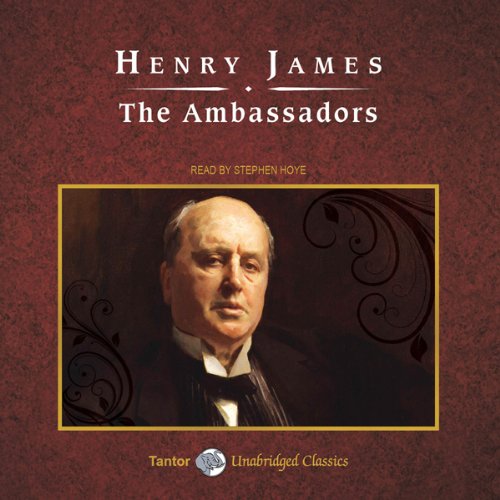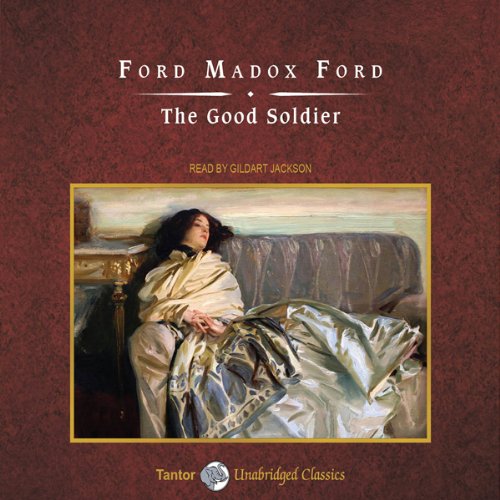
 Audible sample
Audible sample  Playing...
Playing... 
 Paused
Paused  Your audiobook is waiting!
Your audiobook is waiting!
Enjoy a free trial on us
$0.00$0.00
- Click above for unlimited listening to select audiobooks, Audible Originals, and podcasts.
- One credit a month to pick any title from our entire premium selection — yours to keep (you'll use your first credit now).
- You will get an email reminder before your trial ends.
- $14.95$14.95 a month after 30 days. Cancel online anytime.
Buy
-8% $12.99$12.99
The Ambassadors
 Audible Audiobook
– Unabridged
Audible Audiobook
– Unabridged
Here is Henry James' dark comedic masterpiece, written in the final period of his life.
Lambert Strether goes to Paris to bring back Chad, son of the wealthy New England widow he plans to marry. But he gradually comes to feel that life in Paris may hold more for him than in Woollett, Massachusetts.
American-born English author Henry James (1843- 1916), was one of the founders and leaders of realism in fiction and is considered to be one of the great British novelists.
Please note: This is a vintage recording. The audio quality may not be up to modern day standards.
- Listening Length20 hours and 7 minutes
- Audible release dateOctober 3, 2008
- LanguageEnglish
- ASINB001IDPJEU
- VersionUnabridged
- Program TypeAudiobook
 Read & Listen
Read & Listen
Get the Audible audiobook for the reduced price of $3.33 after you buy the Kindle book.
People who viewed this also viewed
- Audible Audiobook
- Audible Audiobook
- Audible Audiobook
- Audible Audiobook
- Audible Audiobook
People who bought this also bought
- Audible Audiobook
- Audible Audiobook
- Audible Audiobook
- Audible Audiobook
- Audible Audiobook
Related to this topic
- Audible Audiobook
- Audible Audiobook
- Audible Audiobook
- Audible Audiobook
- Audible Audiobook
Product details
| Listening Length | 20 hours and 7 minutes |
|---|---|
| Author | Henry James |
| Narrator | Peter Gray |
| Whispersync for Voice | Ready |
| Audible.com Release Date | October 03, 2008 |
| Publisher | RNIB |
| Program Type | Audiobook |
| Version | Unabridged |
| Language | English |
| ASIN | B001IDPJEU |
| Best Sellers Rank | #381,897 in Audible Books & Originals (See Top 100 in Audible Books & Originals) #11,114 in Classic Literature #14,012 in Literary Fiction (Audible Books & Originals) #21,241 in British & Irish Literature & Fiction |
Customer reviews
Customer Reviews, including Product Star Ratings help customers to learn more about the product and decide whether it is the right product for them.
To calculate the overall star rating and percentage breakdown by star, we don’t use a simple average. Instead, our system considers things like how recent a review is and if the reviewer bought the item on Amazon. It also analyzed reviews to verify trustworthiness.
Learn more how customers reviews work on AmazonReviews with images
-
Top reviews
Top reviews from the United States
There was a problem filtering reviews right now. Please try again later.
Strether arrives in Paris thinking that he will find Chad debauched by women, wine, and song but is greatly surprised to find him flourishing and in fact improved from the shallow boy he once knew. He is more of a gentleman with a sophisticated mind and tastes. The harpy destroyer of his innocence, Madame de Vionnet, turns out to be an elegant and charming woman who is currently separated from her husband. Strether can't figure out if Chad is in love with Vionnet our her young daughter, or if he is in love with neither.
Ironically, the more time Strether spends in Paris hanging out with Chad and his coterie, the more Strether HIMSELF doesn't want to return home to the States! He begins to realize that he hasn't really ever had time to experience and enjoy life and maybe it's not to late to find a small bit of happiness in Paris among young minds and art.
Henry James himself ranked this novel as his best so I thought it would be a great place to try reading his work for the first time. Unfortunately, this book is from his "late period" which means its language is a lot more convoluted and dense and can be a bit hard to understand coming into it unaware as I did. The experience to me was closest to reading Shakespeare for the first time. At points all through this book I would read 2-3 pages and the realize that I had no idea what had just occurred. And I consider myself an above average reader. A casual reader would lose interest in this book in the first few pages. As you start reading you catch the broad strokes of the action and you have to use context clues not to infer meaning from individual words but whole sections of text.
The great thing was that the more of the book you read, the more beautiful it becomes because your mind starts to get used to the style and is able to decode the meaning of the text. By the end of the book, the language and sentence construction no longer bothered me and I was able to greatly enjoy it.
I would say the main conflict of the book is Strether's regret. The fact that at 55, he starts to question his life choices and for the first time, he begins to think about what he wants to do with his life. Fortunately for him, within the confines of this novel, he discovers that maybe he still has TIME to sort out his future. Does he want to go home and marry Mrs Newsome, does he want to stay in Paris and get together with one of the other women he has met, or does he want to stay single? He's ended up middle aged, repressed, depressed, and dull, but at least the author gives Strether the opportunity to make something of his inner life even at this late stage in his life. You'll have to read the book to see if Strether seizes the opportunity he's been given.
The narrative follows "ambassador" Lambert Strether to Paris in pursuit of his widowed fiancée, Mrs. Newsome's, son Chad--whom she believes to be romantically involved with an undesirable woman. Strether's mission is to extricate the wayward youth and return with him to Massachusetts directly. Once in Paris, however, Strether falls under the spell of the city and finds Chad refined rather than corrupted by its influence and that of his charming companion, Madame de Vionnet. The summer wears on with little correspondence between Strether and the Newsomes waiting at home. Impatient to see her son returned and suitably married, Mrs. Newsome sends yet another envoy, Chad's cynical sister Sarah Pocock, to confront the errant Chad and a Strether whose view of the world has changed profoundly. In the end, it is Strether who prevents Chad from returning to America.
The highlight of the text is certainly Strether's speech to Chad's friend Little Bilham in Book Fifth, in which he gives voice to his new sense of things: "Live all you can; it's a mistake not to. It doesn't so much matter what you do in particular, so long as you have your life. If you haven't had that what have you had? Do what you like so long as you don't make my mistake. For it was a mistake. Live!" It is an expanded vision of life, an affirmation that seems an appealing climax to Strether's confrontation with the realities of his circumstance. The sentiments of Strether's speech, however, are tested in the remaining two-thirds of the narrative.
Top reviews from other countries
Finde es nett, dass Sie nachfragen !
Mit Gruß,
E. Trzesniowski





















